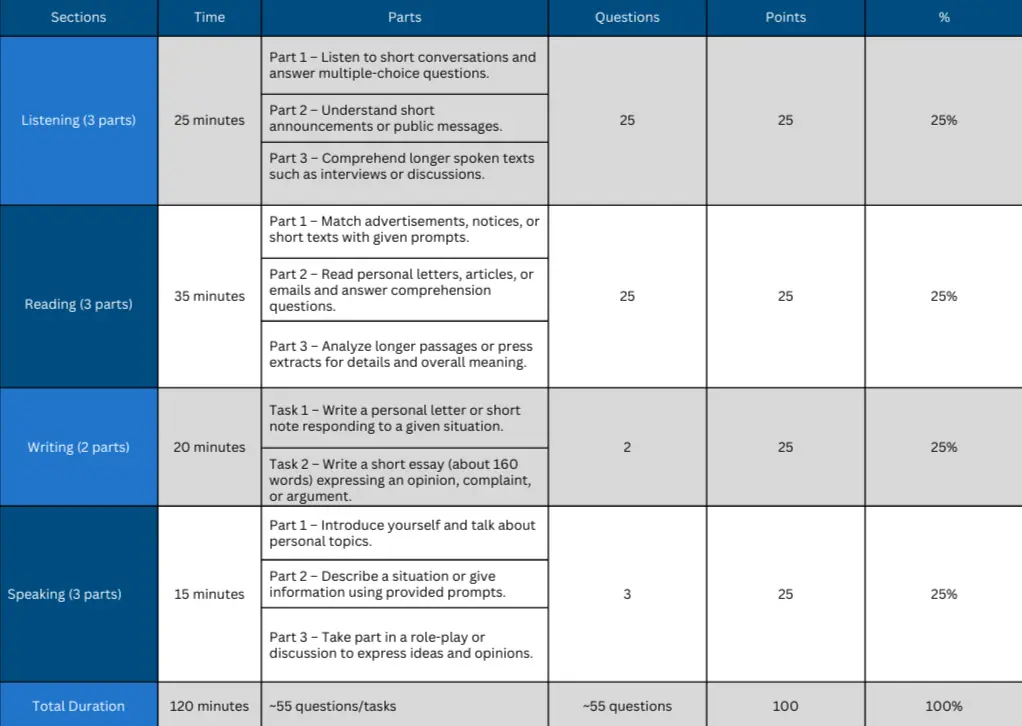A French exam is a formal assessment that measures a learner’s proficiency in the French language, evaluating skills such as listening, reading, writing, and speaking. These exams are recognized internationally, providing proof of language ability for academic, professional, or personal purposes. For intermediate learners, French DELF B1 preparation is essential, as it focuses on enhancing communication in daily life, work, and study situations while building confidence in more complex language use.
French delf B1 Exam structure

- This table explains the French DELF B1 exam structure with emphasis on balanced skill assessment.
- It integrates both French DELF B1 preparation and delf b1 french practice focus points.
Eligibility Criteria
- Minimum Age Recommendation: The French DELF B1 exam is generally recommended for candidates aged 16 and above, as it requires a higher level of independence in communication. At this stage, learners are expected to handle everyday conversations, explain opinions, and engage in discussions about familiar topics such as studies, travel, or work situations.
- Language Knowledge Required: Candidates should typically complete 350–400 hours of structured French study before attempting this level. This ensures they can follow moderately complex texts, understand longer conversations, and practice effectively with French DELF B1 sample papers to strengthen comprehension and written expression.
- No Formal Academic Qualification: There are no strict academic prerequisites for the DELF B1 exam. The focus is on real-life communication skills, which makes it accessible to students, working professionals, and individuals preparing for personal or professional mobility.
- Purpose and Recognition: The DELF B1 certificate is widely recognized internationally and is often required for academic admissions, visa applications, or entry-level professional opportunities in French-speaking countries. Consistent French DELF B1 preparation and practicing with French DELF B1 sample papers help candidates meet the eligibility expectations and succeed in the assessment.
Exam Pattern – Detailed Structure
The French DELF B1 exam assesses intermediate-level communication skills through four sections: Listening, Reading, Writing, and Speaking. Each part is designed to test how well candidates can understand, respond, and interact in practical, everyday situations with more independence.
Listening – 25 minutes | 3 parts | ~25 questions
Part 1: Candidates listen to short conversations followed by multiple-choice questions, identifying key information such as place, context, or intention.
Part 2: Announcements, interviews, or short recordings are played, and test-takers decide if statements are true or false.
Part 3: A longer audio such as a discussion, radio broadcast, or news segment is provided, and candidates answer comprehension questions. Consistent French DELF B1 preparation with delf b1 french sample papers helps improve listening accuracy.
Reading – 35 minutes | 3 parts | ~25 questions
Part 1: Match short texts such as advertisements, signs, or notices with given situations.
Part 2: Read emails, letters, or short articles and answer questions on meaning and purpose.
Part 3: Understand and interpret longer texts such as press extracts, schedules, or brochures, focusing on details and main ideas. Using delf b1 french sample papers builds confidence in tackling a variety of texts.
Writing – 45 minutes | 2 tasks
Task 1: Write a personal letter, note, or email based on a provided situation.
Task 2: Compose a short essay of about 160 words expressing an opinion, argument, or formal request, for example writing a complaint or explaining your viewpoint on a familiar issue. Structured French DELF B1 preparation ensures candidates develop both clarity and accuracy.
Speaking – 15 minutes | 3 parts
Part 1: Introduce yourself and speak briefly about personal topics such as studies, hobbies, or work.
Part 2: Describe a situation or give information using prompts provided by the examiner.
Part 3: Engage in a role-play or discussion where you express ideas, defend opinions, or negotiate solutions, such as planning an event or debating everyday issues.
The French DELF B1 exam ensures candidates can communicate effectively in familiar contexts, manage real-life situations, and demonstrate independence in expressing thoughts and opinions.
Passing Criteria
- Score Breakdown: The French DELF B1 exam is scored out of 100 points, with Listening, Reading, Writing, and Speaking each contributing 25 points. This balanced distribution ensures that candidates must demonstrate competence across all four areas rather than relying on strength in a single skill.
- Passing Requirement: To successfully pass, candidates need a minimum of 50 points overall, along with at least 5 points in each individual section. This prevents learners from skipping practice in one area, making consistent French DELF B1 preparation essential to achieve a well-rounded performance.
- Evaluation Method: Each section is assessed on task completion, clarity, and accuracy. For instance, in Writing, candidates are graded on how effectively they structure a letter or essay, while in Speaking, examiners focus on fluency, interaction, and the ability to defend simple opinions rather than using overly complex vocabulary.
- Role of Listening Practice: Listening often proves challenging because candidates must quickly interpret conversations, public announcements, or radio extracts. Regular practice with delf b1 french sample papers that include listening tasks improves comprehension and helps test-takers adapt to different accents and speech speeds.
- Balanced Preparation: Since all sections carry equal weight, learners are encouraged to dedicate study time proportionally across skills. Using delf b1 french sample papers for reading and writing, combined with structured French DELF B1 preparation strategies, ensures a steady improvement that meets the exam’s passing criteria.
Conclusion
The French DELF B1 preparation stage is a crucial step for learners aiming to demonstrate solid intermediate language skills. This exam evaluates your ability to handle real-life conversations, express opinions, and understand more complex texts. With consistent practice in listening, reading, writing, and speaking, success becomes achievable. Begin your French DELF B1 preparation today to strengthen your communication skills and unlock international opportunities!
Read Also: French Delf A2

